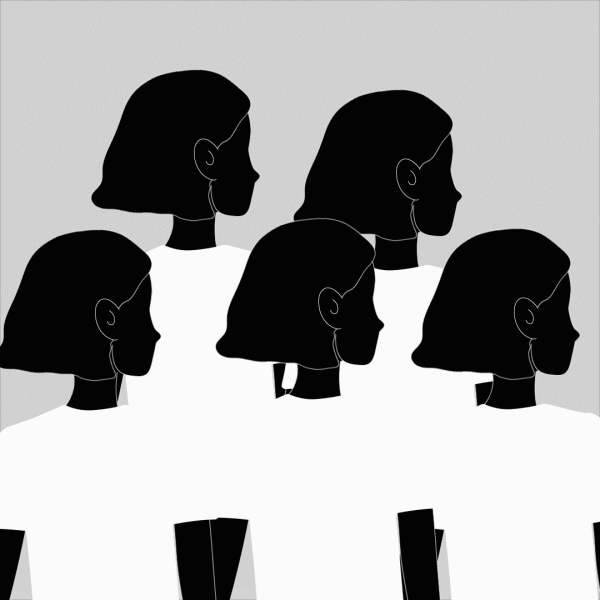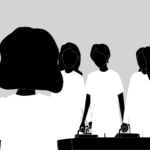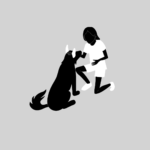WHERE ARE THE WOMEN?
“Where are the women?” was a question made by Cynthia Enloe in 1989, when she was thinking about international politics. But this question has been a pushing force for a number of historians who aimed to move beyond a narrative of “big people” who attempted to dominate our understanding of the past.

Illustration: Argjira Kukaj
Women’s activism, in whatever form, constitutes a very current topic in the society and it will remain to be so. But, analyzing its engagement and involvement in the social processes of a country or a state, is a bit difficult. I say this because, when we begin to research or write about the role and impact of women in representation it is impossible not to mention the historical perspective. Unfortunately, not just in our socitey, but the entire world, the historical discrimination of women was and maybe still is the biggest crisis of the human kind.
“Where are the women?” was a question made by Cynthia Enloe in 1989, when she was thinking about international politics. But this question has been a pushing force for a number of historians who aimed to move beyond a narrative of “big people” who attempted to dominate our understanding of the past.
Historically, women have often been portrayed homogeneously as victims of war.
Women can have many roles and identities during times of conflict. In some situations, like those mentioned in BRIDGE- development’s report, titled “Overview Report on Gender and Armed Conflict”, the social construct of women as ‘mothers’ and ‘culture defenders’ within nationalist freedom movements has limited women’s activism in conflict and the processes postwarm rebuilding. In some situations, women have mobilized to get support, work and services during war efforts, thus making them active participants in war, like what happened in Kosovo. The gender roles which society had defined until this period started to fade. Women were directly engaged in war, joining the armed groups of Kosovo’s Liberation Army. While taking into consideration the many possible roles and identities of women, their position regarding conflict cannot be homogenized. But, as Mertus wrote for the 1990’s Kosovo, while “men held leading positions in the resistance of Kosovo Albanians”, women too had an active role.
In Luginë of Preshevë, and especially in the history of the Liberation Army of Preshevë, Medvegjë and Bujanoc, we can notice similarities in the process of war. While there have passed more than twenty years since the war of LAPMB, it still remains a highly discussed topic for many. While men’s contributions within LAPMB are cherished and discussed in different forms, there was a group within this army whose contributions that are unknown to the general opinion. It is women of this liberation movement who were directly involved in this battle, some with weapons on their hands spending months in the first front and some offering medical help to the wounded soldiers and not only, preparing food and very often doing all the logistics of this movement.
“Since I had earlier experience in the war of KLA, I now had it easier to deal with the transportation of necessary medicine throughout mountains for the soldiers’ wounds. I usually moved between points and mountains to secure medicine because we would get them all from Kosovo through illegal entrances, this wasn’t easy to do”- explains Linda Fetahu who served as a nurse in LAPMB.
Even though the OVL of LAPMB has not shown much care to register and keep the data regarding women’s contribution in the war, during research and interviews, we have managed to identify only six women who had an important role in this process. The fact that women consisted of a small number compared to men participating in the war of LAPMB, should not imply the loss and discredit of their contribution in history. Patriotic feelings and the wish to liberate the valley from the serbs, pushed girls like Drita Osmani, Elza Sadiku, Linda Fetahu to join the Liberating Army of Preshevë, Medvegjë and Bujanoc, who at that time where only twenty years old. Even though the patriarchal mentality which was very present in the valley had taught them that women should stay home and men should be outside, and that weapons were banned for them, still they went on a journey from Prishtine to one of the operational military zones.
“I went to war together with Elza Sadiku, and it was very interesting how they would not allow women there, because of that masculine mentality that females cannot be part of war, they wouldn’t allow. What we did with Elza, we went from Prishtina to Gilan with auto stop. From there we continued to Llovs and then in the mountains”- remembers Drita.
As if the tiredness from the road was not enough, when they went to the war zone, they faced prejudice, offensive words and other mistreatments from the soldiers there, who, influenced by their mentality, could not accept that women could give their contribution in the front line. According to them a place like that is for a different type of girls anot not educated ones like Drita and Elza.
“When we met with the commander of the zone, we told him we were not there for a visit but for war. He put us in a private room and after a discussion he asked us, do you accept to be called whores of Presheva, you know, put in the most arrogant way. I feel bad about these words but it is better to know them and to give history our real struggles. I said yes, because the Albanian cause is bigger than a false reality and a worldview on my image”- says Drita Osmani.
Like Drita, Elza too served in the operative zone known as Shoshajë (because of the name of the village), brigade 113 lead by commandant B.O., it was also the zone that experienced war the hardest because of their geographical position and the closeness it had with the enemy bases.
“On the first day they sent me to an unlikeable zone for me, because I wanted to fight and not be away from the front lines. I called the commander and I told him to position me in the front lines, I wasn’t there to teach ‘kids’ how to fight ”- expresses Elza, who was part of LAPMB.
Their journey for the ideal of national cause was not easy for them. Other than the responsibility they had taken to become part of the army, they were also loaded with another burden, to be careful in preserving the morals of their families. To them it did not matter how the girls felt or their contribution and commitment. Knowing the goal and the decision they had made to become part of war, no one, no prejudice and no offensive word bothered them. Once they were accepted as soldiers, from the first day that they had worn the uniform, women asked their commanders to be put in the zones where the war was the roughest, to show their commitment they had taken. The calls for help in other points were often and names of girls changing positions were very common.
About the author: Egzona Hajrullahu, 24 years old from Presheva, is studying sociology at the Philosophical Faculty of the University of Prishtina.
This grant is supported by the Balkan Trust for Democracy, a project of the German Marshall Fund of the United States


